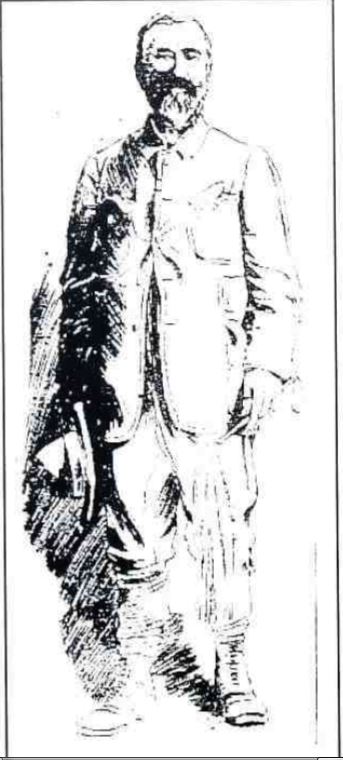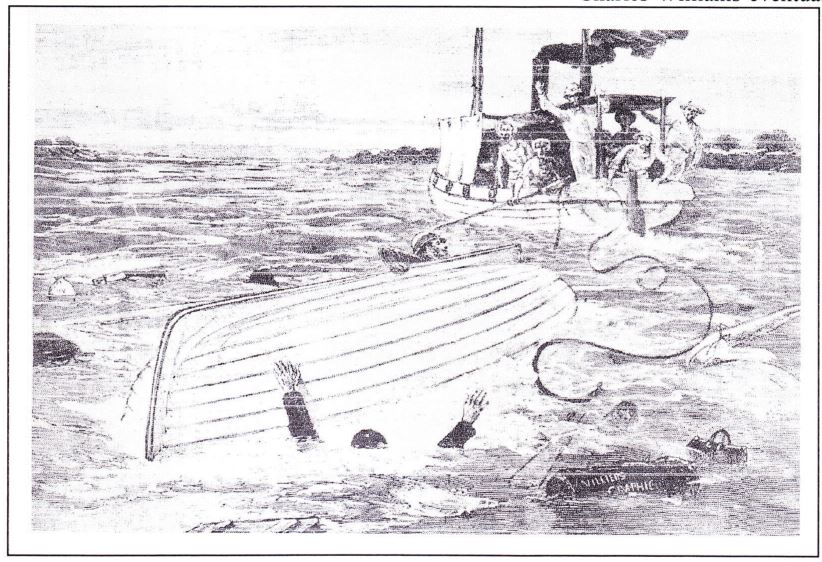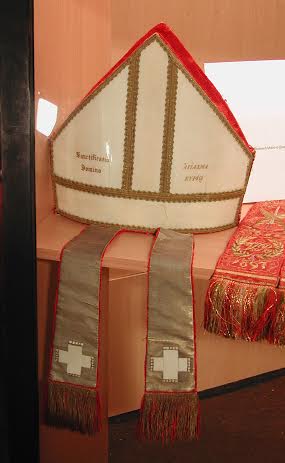Charles Frederick Williams

(1838-1904)


Charles Frederick Williams is a great-great-grandfather of John
Fairley.
Charles Williams was a celebrated British war correspondent,
newspaper editor, journalist and author. He traveled to many war
zones with the British Army reporting worldwide on some of the
key events of the late 1800s.
In 1859, he became a leader writer for the London Evening
Herald. In October 1859, he had began a connection with The
Standard which had lasted until 1884. From 1860 until 1863, he
worked as a first editor for the London Evening Standard; and
from 1881 until 1884, as the first editor of The Evening
News.
Early in his career, Charles Williams shared an office with
friend and colleague Robert Gascoyne-Cecil, who would later
become Lord Salisbury, Prime Minister of Great Britain. They had
a standing tradition of always sending out for two beers with
payment alternating between each man. Many years later, Williams
was in the lobby of the House of Lords. Lord Salisbury
approached him with outstretched hand and asked, "By the
way, Mr. Williams, whose turn is it to stand the beer?"
A friend of explorer Henry Morton Stanley, Williams gave him a
compass that had been on a number of his expeditions. Stanley
took it with him to Africa and it now is on display at the Royal
Museum of Central Africa in Belgium.
In Rudyard Kipling's novel, "The Light that Failed,"
the character of Mr. Nilghai, the war correspondent, was based
on Charles Williams.
He was described as "a man of restless, stormy, and
combative temperament, always driving at full speed, with
something of the force of a hurricane. Williams, however, had an
indomitable physique, which he was generally putting to severe
trials. The amount of "copy" that he produced in the
course of a year was really prodigious, and he worked early and
late. He was, too, an omnivorous reader, devouring books of all
sorts, and having information to hand on all possible
subjects... a man of great, strong, and original character"
Williams was best known for being a war correspondent. For The
Standard, he was at the headquarters of the Arm�e de la Loire, a
French army, during the Franco-Prussian War in 1870. He was also
one of the first correspondents in Strasbourg, where the French
forces were defeated. In the summer and autumn of 1877, he was a
correspondent to Ahmed Muhtar Pasha who commanded the Turkish
forces in Armenia during the Russo-Turkish War of 1877 and 1878.
Williams remained constantly at the Turkish front, and his
letters were the only continuous series that reached England. In
1878, he published this series in a revised and extended form as
The Armenian Campaign: A Diary of the Campaign on 1877, in
Armenia and Koordistan, which was a large accurate record of the
war, even though it was pro-Turkish.
From Armenia, he followed Muhtar Pasha to European Turkey and
described his defense of the lines of Constantinople against the
Imperial Russian Army. Williams was with General Mikhail
Skobelev at the headquarters of the Imperial Russian Army when
the Treaty of San Stefano was signed in March 1878. He reported
this at the Berlin Congress.
At the end of 1878, he was in Afghanistan reporting the war, and
in 1879 published the Notes on the Operations in Lower
Afghanistan, 1878�9, with Special Reference to Transport.
In the autumn of 1884, representing the Central News Agency of
London, Williams also joined the Gordon Relief Expedition, a
British mission to relieve in Major-General Charles George
Gordon in Khartoum, Sudan. His was the first dispatch to tell of
the loss of Gordon. While in Sudan, he quarreled with Henry H.
S. Pearse of The Daily News, who later unsuccessfully sued him.
After leaving The Standard in 1884, he worked with the Morning
Advertiser, but later worked with the Daily Chronicle as a war
correspondent. He was the only British correspondent to be with
the Bulgarian Army under Prince Alexander Joseph of Battenberg
during the Serbo-Bulgarian War in November 1885. In the
Greco-Turkish War of 1897, he was attached to the Greek forces
in Thessaly. His last war reporting was on Herbert Kitchener's
Sudanese campaign of 1898. His health did not permit his advance
to South Africa, but he was still able to London a diary of the
South African War for The Morning Leader.
He once served as the Chairman of the London district of the
Institute of Journalists from 1893 to 1894. He founded the
London Press Club were he also served as its President from 1896
to 1897.
Williams was wounded three times in action. He was shot in the
leg in Egypt in 1885 during General Buller's retreat from Gubat
to Korti.
He conducted a lecture tour of the United States where he
described the six campaigns, illustrated by limelight
photographs. His audience in Brooklyn, New York was described by
The New York Times as highly delighted by his lecture about the
hardships and adventures. His presentation was "a feast for
the eyes and ears and was highly appreciated by the large
audience assembled."
Williams was a strong adherent to Garnet Wolseley's military
views and policy, and had considerable military knowledge. He
had also published military subjects in several publications
such as the United Service Magazine, the National Review, and
other periodicals. In 1892, he published Life of Sir H. Evelyn
Wood, which was controversial as he defended the actions of Wood
after the Battle of Majuba Hill in 1881. In 1902, he published a
pamphlet, entitled Hush Up, in which he protested against the
proposed limited official inquiry to the South African War and
called for an investigation.

In 1884, the steamer carrying Williams and colleague Frederic
Villiers of The Graphic overturned in the Nile River. Their
rescue led Williams to later commission a unique ivory and gold
miter for the Bishop of London as a thank-offering to God for
his safe return from Khartoum. The miter is still at St. Paul's
Cathedral in London.

With the sanction of Commander in Chief, Field Marshal Viscount
Wolseley, Williams edited a book "Songs for Soldiers for
the March The Camp and the Barracks" to improve morale and
relieve boredom. Included in the book are a number of songs that
he composed. He also wrote about ecclesiastical questions, and
contributed articles and stories to different periodicals.
Williams also wrote fiction, including his book "John
Thaddeus Mackay," a tale about religious tolerance and
understanding.
His books include:
The Armenian Campaign: A Diary of the Campaign of 1877, in
Armenia and Koordistan (1877)
Notes on the Operations in Lower Afghanistan, 1878-9, with
Special References to Transport (1879)
John Thaddeus Mackay (1889)
"How We Lost Gordon" (Fortnightly Review, May 1895)
The Thessalian Campaign (1897)
The Life of Sir Lieut-General Evelyn Wood
England's Defences
Songs for Soldiers
Army Reform
Hushed Up, a Criticism on the South African Campaign
Numerous articles in the United Services Magazine and other
publications
In the Nile Campaign of 1884 until 1885 application was made to
the War Office with the support of the Commander in Chief Lord
Wolseley for medals for Williams and correspondent Bennet
Burleigh. Williams had been twice requested to take command of
some of the men by senior officers on the spot. The Secretary of
War was unable to grant the recognition under the rules of the
day but wrote a letter saying that he regretted that this must
be his decision.
Williams was a recipient of the Queen's Sudan Medal, an award
given to British and Egyptian forces which took part in the
Sudan campaign between 1896 and 1898.
He died in Brixton, London on 9 February 1904. His funeral was
well attended by the press as well as members of the military
including Field marshal Sir Evelyn Wood. Colleague Henry Nevison
wrote a long reflection on Charles Williams. It included,
"On the field he possessed a kind of instinctive sense of
what was going to happen. When I went to big field-days with him
he was already an elderly man, and much broken down with the
hardships of a war correspondent's life; but he invariably
appeared at the critical place exactly at the right moment, and
I once heard the Duke of Connaught, who was commanding, say,
'When I see Charlie Williams shut up his telescope, I know it's
all over.'... "And now he is gone, with his rage, his
generosity, his innocent pride, his faithful championship of
every friend, and his memories of so many a strange event. His
greatest joy was to encourage youth to follow in his steps, and
the world is sadder and duller for his going."
![]()

![]()